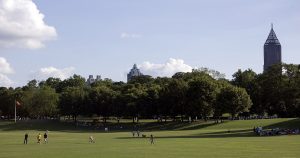
If you need a pick me up, head to the nearest park. Researchers at the University of Alabama-Birmingham found that spending 20 minutes in a park or similar green space is enough to significantly boost a person’s mood.
To test how important parks were when it came to improving people’s moods, the researchers recruited local adults and had them visit Overton, Jemison and Cahaba River Walk Parks in Mountain Brook, Alabama. The locations were selected because they were major public parks in the Mountain Brook area and had a high volume of visitors every day.
Prior to entering the park, participants filled out a short questionnaire evaluating their subjective wellbeing. They then headed into the park where their level of physical activity was tracked with a wearable accelerometer. After leaving the park, participants again filled out a questionnaire.
“Overall, we found park visitors reported an improvement in emotional well-being after the park visit,” said principal investigator Dr. Hon K. Yuen. Given anecdotal evidence prior to the study, this was unsurprising. What did catch the investigators somewhat off guard was that exercise was not necessary to achieve a boosted mood. “We did not find levels of physical activity are related to improved emotional well-being. Instead, we found time spent in the park is related to improved emotional well-being.”
Time, not movement then, is the key to happiness. Researchers argue that the urban parks provide city residents opportunities to engage nature that they would not otherwise have in a concrete jungle. Contact with the natural environment, especially when it is combined with health-promoting or social and recreational activities, allows parks to help visitors alleviate stress, fatigue and mental burnout.
Co-author Gavin R. Jenkins said that the study, despite its small sample size, supports what many people have always known. Public parks and other green spaces are essential in cities that otherwise have such a dearth of natural spaces. That has not, however, stopped parks from facing pressure from the cities in which they reside.
“There is increasing pressure on green space within urban settings,” says Jenkins. “Planners and developers look to replace green space with residential and commercial property. The challenge facing cities is that there is increasing evidence about the value of city parks but we continue to see the demise of theses spaces.”
Hopefully, this latest study on the importance of green space will help protect parks and the incredible benefits they offer to those who visit for as little as 20 minutes.


